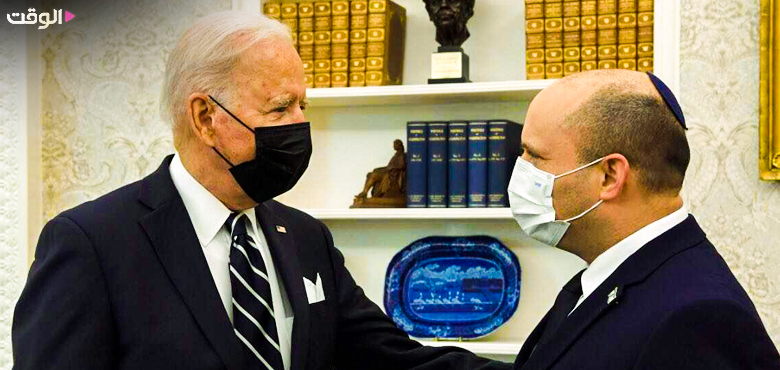Alwaght- As Iran and the world powers prepare to resume nuclear negotiations next week in Vienna, a great deal of stances by supporters and opponents of the nuclear deal and its revival begins to find its way to the media outlets.
In the meantime, the Israeli regime has been one of the actors that has taken the largest number of positions on the forthcoming talks. Although Tel Aviv’s political officials hoped to convince President Joe Biden's administration not to continue as the dialogue was on hold since August due to coming to work of the new Iranian government, with finalization of the seventh round, the Israeli leaders seem to be mobilizing their efforts to cover up their new diplomatic defeat.
Recently, dual positions have been made by the Israelis. Prime Minister Neftali Bennett like his predecessor Benjamin Netanyahu, opposed the deal, formally called Joint Comprehensive Plan of Action (JCPOA), and its revival and emphasized that the regime reserved a right for freedom of action. However, Israeli Defense Minister Benny Gantz in recent comments at a conference in the University of California arranged by Haaretz daily said that he supports a "broader, stronger, and longer" nuclear deal.
The remarks come as the US State Department said that Washington informs Tel Aviv of the nuclear talks developments. In general, it can be understood from these comments that the first scenario of the Israelis is still the non-revival of JCPOA and their alternative scenario is the signing of a new deal with additional clauses and topics. The argument here is that the Israelis not only lost to the Iranians on the ground but also they are proving losers when it comes to diplomatic arena.
Israeli measures backfiring
Since the beginning of the nuclear talks between Iran and the five world powers in 2013, the Israeli regime has explicitly stated its opposition to any agreement, but after the initial failure to stop the talks and change the approach of the Barack Obama administration at the time of reaching an agreement, it put the policy of carrying out sabotaging operations on the agenda. The coming to power of Donald Trump in 2017 further emboldened Tel Aviv to embark on sabotaging actions.
For the so-called aim of stopping Iran's nuclear program, the Israeli regime took a range of actions, from assassinating Iranian scientists to sabotage at the nuclear sites to attacking the Iranian oil and merchant ships. But all these measures against Tehran delivered the reserve, making the Islamic Republic stronger in will to develop a more complete and efficient uranium enrichment chain. Installing new centrifuges and adding to the number of already working enrichment machines and upgrading the enrichment to 60 percent in Natanz site bore witness to the Iranian success to foil the Israeli plots.
An agreement beyond 2015 deal's terms not an option
After failing to stop the talks on the process of agreement revival, in its plan B the Israeli regime seeks support and is lobbying for a new agreement in which its security and Iranian missile program are addressed. This demand should be considered failed from now like past ones. After Trump’s withdrawal from the accord in 2018, Iranian officials repeatedly asserted there would be no negotiations on extra terms to the 2015 deal.
A new nuclear agreement, some calling it JCPOA 2.0, is totally rejected by the new Iranian government, as Tehran said it will not approve of raising non-nuclear issues. This stance is upheld by all the participants– China, Russia, Germany, France, and Britain– which agree that the US can return to the agreement after lifting illegal anti-Iranian sanctions. Iran will restore commitment to the agreement after fact-checking.
Tel Aviv's approach to foist its anti-JCPOA conditions on Iran turns into a fiasco
An eye-catching point here is that at present the Israeli position runs counter to the dominant international stance regarding Iran nuclear deal. Even Washington, Tel Aviv’s main strategic partner, is at stark contrast with the Israelis as it is aware that pressures would not work with Iran and sanctions backfire in terms of affecting the enrichment program. The current international atmosphere is in a way that Biden cannot craft an anti-Iranian consensus, making the American strategists think that there is no alternative to revival of the deal. This situation is nothing but a showcase of the Israel fiasco and would only bring about more international isolation to Tel Aviv.



























